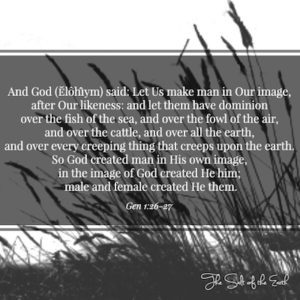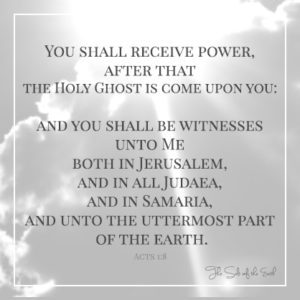Throughout the Bible, we see the unity between God the Father (Jehovah), the Word; Jesus, and the Holy Spirit. However, despite their unity and continuous cooperation, we see a distinction between their roles in the Bible. We can divide the Bible into three dispensations. What are the three dispensations in the Bible? The three dispensations in the Bible are the dispensation of God the Father (Jehovah God), the dispensation of God the Son Jesus Christ (the Word), and the dispensation of God the Holy Spirit.
The creation
The Bible begins in the Book of Genesis with the creation. El-Elohim (God (Jehovah), the Word; Jesus and the Holy Spirit) created the heaven and the earth and all there is within. El-Elohim created man after Their own image and consisted of a spirit, soul, and body. These three elements became one and were called: man. Man was perfectly created and walked after the spirit.
However, God had given man a free will. Therefore man could decide to obey the words of God or not obey the words of God.
When the devil; the adversary of God, came and tempted man, man became curious and began to doubt the words of God.
Man believed the words of the devil above the words of God and became disobedient to God. As a result of man’s disobedience to God, the spirit in man died and the flesh began to reign.
At that moment the perfect relationship between God and man was broken. Man was no longer spiritual but carnal. This became visible in the natural realm because Adam and Eve became conscious of their body and noticed that they were naked. From the moment that they became disobedient to God, the spirit in man died and the devil, the death reigned in the flesh of the carnal man.
But God had a new plan to restore His relationship with man. There had to come a new creation; a new man, since the old creation; the old man was affected by evil and therefore corrupted. This plan of God consisted of the coming of His Son Jesus Christ, Who would deal with the sinful nature in man, that ruled in the old creation, and death, and the coming of the Holy Spirit, Who would raise the spirit of man from the dead and would dwell in the new creation; the new man.
Until the fulfillment of God’s plan of redemption, God had a temporary solution to deal with sinful nature, so that God could have a relationship with mankind. Through the offerings of animals, the blood of animals would temporarily make atonement for the sins and iniquities of fallen man, so that God could have a relationship with the old man.
The dispensation of God (Jehovah)
The first dispensation in the Bible is from Genesis until Malachi and is the dispensation of God the Father. We see the relationship between God (Jehovah) and His carnal people; the house of Israel. We read about their relationship and all the works God did for His people. God spoke to His people through the mouth of His prophets, to guide them. He gave them the law, through Moses, who was His servant and representative, so that His will became known to His people.
But God’s people weren’t always willing to listen to God and obey God. Despite God’s warnings, they often went their own way and compromised with the world, because they wanted to be like the Gentiles and live like the other nations.
But every time, they went their own way and adopted the habits and customs of the pagan nations, they got into trouble. That’s because God had removed His hand from His people (Read also: ‘What happens when a nation forgets God?‘).
The people of God had chosen to become apostates from God. They made their own choice to live like the Gentiles; the world. The people of God were responsible for breaking the relationship and covenant, not God.
Throughout the Old Testament, we see continuous periods of apostasy and periods of dedication to God.
One moment the king and the people of God served God and the next moment they became disobedient to His law and became apostates and adopted the customs and habits of the Gentiles and began to serve strange gods. Until someone arose from the midst of God’s people, read the law of Moses, and exhorted the people to repent and dedicate themselves again to God.
As soon as the people repented, God turned back to His people and took care of them and became their God again.
In this dispensation, we see the righteous love of God and His mercy and faithfulness to His people. We see God’s omnipotence and His wondrous works and miracles.
Throughout this dispensation, we see the unity and relation between God (Jehovah), the Word; Jesus, and the Holy Spirit.
God prophesied through the mouth of His prophets about the coming of the Messiah: Jesus the Christ and the coming of the Holy Spirit.
The dispensation of Jesus Christ; the Word
The second dispensation is from Matthew until Acts 1:9. In this dispensation, Jesus Christus; the Word is the center. We read about the coming of Jesus Christ, the Son of God. Jesus; the living Word who became flesh, came to the earth as the Messiah, just as God prophesied through the mouths of His prophets.
In this dispensation, we see the relationship between Jesus Christ and the carnal people of God (Israel). We see Jesus; the Word in action and see all the signs, miracles, and wonders He did in the power of the Holy Spirit, among God’s people.
Jesus represented God the Father and His Kingdom. He preached and brought the Kingdom of God to the old carnal man; the people of Israel. Despite the fact, that in this dispensation Jesus is the center, we see the unity and relation between God the Father, Jesus, and the Holy Spirit.
Jesus came for the lost sheep of the house of Israel
Jesus the Messiah came in the first place for the lost sheep of the house of Israel and not for the Gentiles (Matthew 15:24). He even compared the woman, who was a gentile, with a dog! But because of her great faith and perseverance, she got what she asked for (Matthew 15:21-28)
Many times Christians say Jesus was a friend and ate with tax collectors and prostitutes. They say this to justify their friendships with ungodly people; the world and to justify the fact, that they live just like the world. But their statement is not quite right. Jesus indeed ate with tax collectors and prostitutes, but…
First of all, according to the flesh, they belonged to God’s people and were considered the lost sheep of the house of Israel. They were considered sinners on the basis of their works. Therefore they were treated as the Gentiles and were locked out of the congregation of God.
Secondly, when they heard the words of Jesus and were confronted with their sins, they repented from their way and turned away from their works, and turned to Jesus. The Pharisees still considered the tax collectors and prostitutes as sinners and because of the fact that Jesus ate with them, they assumed that Jesus was a friend of sinners and that He approved and allowed their sins. But the Pharisees didn’t know that the sinners of God’s people had repented. The Pharisees still considered them and treated them as sinners, but Jesus didn’t consider them as sinners anymore, because of their repentance (Read also: ‘Was Jesus a Friend of Publicans?).
Jesus reconciled man back to God
Jesus came to restore the relationship between God the Father and the old fallen man, which was broken in the garden of Eden. He became the Son of man, and took all the sins and iniquities of fallen man upon Him and destroyed the nature of fallen man in His flesh and reconciled man back to God.
In this dispensation, we see the coming of Jesus Christ, His work of redemption and the redemption of the old man; the old carnal fallen man.
Jesus prophesied to His disciples about the coming of the Holy Spirit. He announced the coming of another Comforter; the Holy Spirit. Just like the Father announced the coming of Jesus Christ and the Holy Spirit.
The dispensation of the Holy Spirit
The third and final dispensation begins in Acts 2 and is the dispensation of the Holy Spirit. We see the coming of the Holy Spirit and the relationship between the Holy Spirit and the new creation; new man. The new creations are the church; the body of Jesus Christ. In this dispensation, we also see the unity and relationship between God the Father, Jesus; the Word and the Holy Spirit. The Holy Spirit represents the Father and Jesus Christ; the Word in the new creation; the new man.
The Holy Spirit testifies of Jesus Christ, just like Jesus testified about His Father. They are inseparable, just like the new man consists of a spirit, soul, and body
In this dispensation, we see the works of the Holy Spirit.
We read about the signs, miracles, and wonders, He did through the new man. Just like Jesus did, Who was the First of the new creation.
Without the Holy Spirit, the new man cannot do anything. The new man is totally dependent on Him, just like Jesus.
The promise and coming of the Comforter; the Holy Spirit was in the first case meant for the people of Israel. But by the grace of God, salvation and the promise also came unto the Gentiles (Romans 11:11). Everyone, who believed in Jesus Christ and was willing to lay down his sinful nature and turn away from his sin and serve God, had the opportunity to become born again in the spirit, and become a new creation; a son of God and part of the body of Christ.
Everyone, who is born again in Jesus Christ and grafted on Jesus Christ, belongs to the true people of God and possesses the Holy Spirit. This third and final dispensation is still in force and will last until the end of time.
‘Be the salt of the earth’







